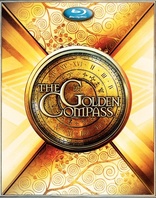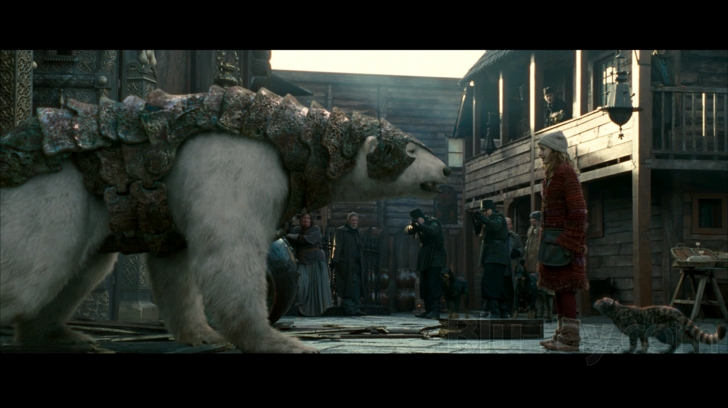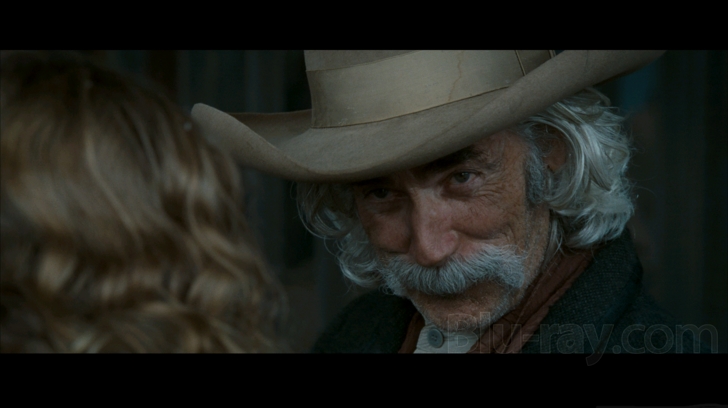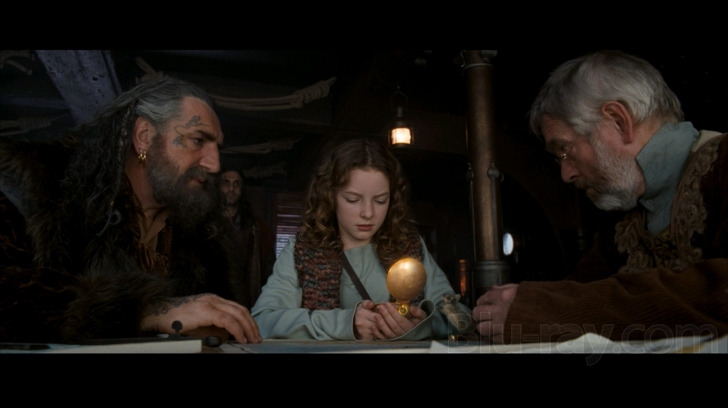The Golden Compass Blu-ray Movie
HomeThe Golden Compass Blu-ray Movie 
New Line Cinema | 2007 | 113 min | Rated PG-13 | Apr 29, 2008
Movie rating
6.1 | / 10 |
Blu-ray rating
| Users | 4.0 | |
| Reviewer | 4.0 | |
| Overall | 4.0 |
Overview
The Golden Compass (2007)
In a wondrous parallel world where witches soar the skies and Ice Bears rule the frozen North, one special girl is destined to hold the fate of the universe in her hands. When Lyra Belacqua becomes the keeper of the Golden Compass, she discovers that her world - and all those beyond - is threatened by the secret plans of Ms. Coulter. With the help of Lord Asriel and a group of unlikely allies ready to stand at her side, Lyra embarks on an extraordinary quest that celebrates friendship and courage against all odds. Based on author Philip Pullman's bestselling and award-winning novel, The Golden Compass tells the first story in Pullman's His Dark Materials trilogy.
Starring: Nicole Kidman, Daniel Craig, Dakota Blue Richards, Ben Walker, Freddie HighmoreDirector: Chris Weitz
| Adventure | Uncertain |
| Family | Uncertain |
| Fantasy | Uncertain |
Specifications
Video
Video codec: VC-1
Video resolution: 1080p
Aspect ratio: 2.39:1
Original aspect ratio: 2.39:1
Audio
English: DTS-HD Master Audio 7.1
Subtitles
English, English SDH, Spanish
Discs
50GB Blu-ray Disc
Two-disc set (2 BDs)
Packaging
Slipcover in original pressing
Playback
Region A (locked)
Review
Rating summary
| Movie | 3.0 | |
| Video | 3.5 | |
| Audio | 4.5 | |
| Extras | 4.5 | |
| Overall | 4.0 |
The Golden Compass Blu-ray Movie Review
A valiant adaptation effort shines in high definition.
Reviewed by Lindsay Mayer April 27, 2008This cinematic adaptation of the first book in a sweeping fantasy trilogy was certainly a valiant attempt - I will give it that. Unfortunately, the film suffers too much under misdirected, big budget wizardry and good intentions. As it is, the final product runs almost like a really good trailer for a better, nonexistent film.
Northern Lights was the first fantasy venture for Oxford professor Philip Pullman, who began it upon the vague premise of writing some contemporary form of Paradise Lost, a perennial favorite of his. Unlike some authors such as Jo Rowling, who detail and outline their story arcs before fleshing them out on the page, Pullman uses a very freeform style of writing - taking glimmering bits of inspiration and forming them into something larger and more significant as the story progresses. His eventual trilogy became especially epic, garnering impressive accolades and high profile vitriol alike.
It was the former that made Hollywood sit up and take notice of the books as possible film adaptation fodder; Northern Lights won a Carnegie Medal in 1995 (subsequently winning the 70th anniversary "Carnegie of Carnegies" in 2007), and Amber Spyglass won the esteemed Whitbread Award – an honor typically reserved for adult literature – upon its publication in 2000. No doubt having a desire to cash in on the current fantasy craze, New Line picked up the rights to the trilogy soon after Spyglass' Whitbread win.
Northern Lights, known as The Golden Compass in the United States due to a publication error (Pullman had intended for the entire trilogy to be called The Golden Compasses, but that was misconstrued as just the first book's title), is an engrossing introduction to a weighty trio of literature that really isn't your average young adult fantasy. Finding its creative inspiration in Paradise Lost should give some readers an idea of what to expect from this 1300 page tale. The books incorporate themes of original sin, the quest for knowledge, and the battle for absolute power. It very obviously contains elements from Judeo-Christian mythology, and treats them with a rather straightforward, cutting cynicism. It is this thematic content, occurring within the parallel worlds of His Dark Materials - as well as the author's open atheism - that has drawn the bulk of its criticism from the public. A good number of Christians have taken offense at the books' content, some going as far as to accuse them of having a corrupting influence on the children they are supposedly aimed at. Naturally, a backlash against the first book's film adaptation followed suit; campaigns to boycott The Golden Compass during its theatrical run were not unheard of in the U.S. market. The film even earned some highly critical sentiment from the Vatican itself.
Such acrimony smacks of hysterical religious crowds aiming their insecurities at yet another collection of literature skewed at a readership with a younger age bracket. It feels awfully similar to the sentiments expressed about Harry Potter just a few years ago, although Pullman's books are more overtly critical of established religious tradition. They apparently pose more of a threat than prepubescent boarding school students waving sticks around to defeat the patented Forces of Evil. In any case, the film, released in the hectic chaos of Christmas theatrical fodder, underperformed in ticket sales in the U.S. market. Its subsequent release in many international cinemas has bounced it back financially, as the film has tended to have a warmer reception in other countries.

Lyra Belacqua takes a diplomatic approach with the hotly perturbed Iorek Byrnison.
My main gripe with The Golden Compass film is just how poorly its execution was approached. For some reason, the film was unquestionably destined for live action from the outset, following the trend of the many other fantasies, awesome and forgettable, that have come and gone in the last 7 years. One has to wonder if New Line et al really understood what they were getting into before work went underway. Pullman's world is populated by a plethora of fantastic creatures and concepts. The panserbjørne, giant armoured ursines based on our world's polar bears; the sentient quadruped Mulefa race; as well as the most prevalent and oddly attractive concept of dæmons. Dæmons are integral human counterparts; they are a physical manifestation of a person's soul, existing outside their bodies in animal form, and remaining close beside them throughout their life.
All of these creatures demand a hefty amount of aid from visual effects artists, and the dæmons in particular required loads of pre-filming shot layouts and mime work from the cast. One gets a good feel for how much of a complicated, multi-step process this was when watching the documentaries featured on the second disc. The result is lots of extra resources spent on CG work, prop assistants and puppeteers, and the like. Crew reflections out-and-out compare it to making an animated film with some elements of live action. Which leads one to wonder why, then, bother making a live action film in the first place? This type of material lends itself beautifully to animation, which could have interpreted it more directly (and imaginatively) in a shorter amount of time, and for far less money.
The choice of crew is a bit odd, to boot. Director Chris Weitz doesn't exactly have the most convincing credentials, having helmed films like About A Boy and American Pie. It seems that's a hot trend in big budget U.S. fantasy films though - hiring on a relative unknown to helm huge, fantastic undertakings. If an unusual directorial candidate professes their love for the source material, apparently that's all it takes to get the job. As close as Weitz is to the original literature, however, the behind-the-scenes featurettes seem to reveal a lack of enthusiasm for the project. Day one, and Weitz remarks, "Any more [preparation] would have been pointless, so we had to start at some point." Later on, "We're halfway through our filming schedule; I suppose I feel surprised to still be walking and talking - I'm excited at the prospect of someday having a life again." If these are only lame attempts at self-deprecating, sarcastic humor, they certainly don't feel as such. It's indicative of his self-esteem when he states at one point that reading fan reactions on the internet would at times give him sleepless nights.
The filmmaking approach leaves a bit to be desired. It feels as though the film progresses in a sort of perfunctory manner, jumping from one major event to the next. That's not uncommon in mainstream fantasy adaptation - story is often sacrificed for budget, runtime, and MPAA ratings. Still, Golden Compass feels slightly more mechanical than most. Here's hoping, if the next film or two are fortunate enough to get the greenlight, that the pacing will be significantly improved.
I suppose a bit of exposition on the story itself is in order. The protagonist is one Lyra Belacqua (Dakota Blue Richards), an 11-year-old scoundrel of a girl who resides at Jordan College, loosely based on the amalgam of universities in Oxford. Taking place in a world parallel to our own, at an unknown time in history, there is much that is similar, and yet markedly different about this world, which is never given a proper collective name. Lyra finds herself listening in on information she should not be privy to; a debate between the powerful Lord Asriel (Daniel Craig), scholars of the college, and representatives of the governing force known as the Magisterium. A mysterious substance called Dust is the topic of discussion, intimately involving the fate of many worlds, in addition to the control of Lyra's own. In classic "chosen one" storytelling fashion, Lyra proves to be the key in the oncoming war for free will. She is given an alethiometer, the eponymous golden compass, by the master of Jordan before being sent off with the cold, quietly threatening Marisa Coulter (Nicole Kidman).
An increasing amount of children begin to mysteriously disappear, and Lyra learns of Mrs. Coulter's part in the entire insidious plan. This leads her to the far north, chancing an encounter with the Texan aeronaut Lee Scoresby (Sam Elliott). Lee points Lyra in the direction of an exiled and disenchanted panserbjørne named Iorek Byrnison (voiced by Sir Ian McKellen), who has had his cherished armour stolen from him by the local townspeople. Helping Iorek reclaim it, the bear then swears allegiance to Lyra. But the quest for the missing children is only a small event, insignificant compared to the larger forces at odds with one another. In that regard, The Golden Compass, being the first leg of an epic "triathlon" of sorts, only gives a taste of the entire literary arc. The overall conflict and resolution are still a ways off, and the film leaves the viewer hanging just as much as the The Fellowship of the Ring did back in 2001.
The Golden Compass Blu-ray Movie, Video Quality 

The Golden Compass comes encoded in a high bitrate VC-1 presentation, averaging around 25 to 30 Mbps. This release looks quite impressive, though it does sport some drawbacks. The film's color palette has been well-preserved; the overall tone does not have a vividly bright quality to it, nor is it drastically dull. It feels natural; a lived-in world full of burnished golds for the affluent college and icy hues in the far north.
Black levels are excellent and remain consistent throughout the picture. In addition, no noticeable artifacts were present. One important aspect of this film is, of course, the profuse amount of CG effects, and it is to be noted that they look excellent on this Blu-ray Disc. Subtle touches, like spectral sheen on the hairs of the dæmons Pantalaimon and Stelmaria, are captured beautifully on high definition; I don't recall catching such a detail when seeing this film in the theatre.
Unfortunately, being that New Line is under Warner Bros, the mastering of this film likely had a hefty amount of digital noise reduction applied to it, as film grain and fine detail such as skin pores or cloth textures are noticeably absent. Despite the overall clarity of the picture, it definitely has a "tuned down" feel to it, and I found that highly unfortunate.
The Golden Compass Blu-ray Movie, Audio Quality 

The sole audio option offered for this feature is DTS-HD MA 7.1 , so if you have a Blu-ray player that cannot properly decode this audio codec, you're missing out on a stellar experience. Fortunately the firmware update for the DTS-HD decoder on the PlayStation 3 was just released, so the many out there who utilize the console as their BD player will be set. For purposes of this review, the merits of the audio mix were sampled on a 5.1 surround system.
As with the picture quality, The Golden Compass has a mostly sound audio mix (no pun intended), but unfortunately has a niggling drawback or two. Dialogue is clear and easy to decipher, and the surround effects are superb. LFE is used in healthy amounts for such effects as landing zeppelins and a titanic one-on-one panserbjørne battle. The most significant flaw in this mix, however, is the blaring imbalance of the musical score. During intense action sequences especially, the soundtrack rose to such degree that I found a constant need to manually adjust the volume. Having just calibrated the speakers a day previous, I found this audio issue more than a little annoying.
The Golden Compass Blu-ray Movie, Special Features and Extras 

The Golden Compass is supplied with a veritable wealth of extra features; so many, in fact, that a dedicated second disc has been included on its Blu-ray and DVD releases. Eleven documentaries, each ranging from 7 to 26 minutes in length, make up the meat of the supplements, while a respectable number of art galleries, as well as the first disc's commentaries, round out the rest. All are shot in HD and utilize DTS 5.1 or DTS 2.0 stereo sound. Almost every documentary features optional Spanish and English SDH subtitles, to boot.
The Novel: Author Philip Pullman and the Consequences of Curiosity – An engaging look at the book's intelligent and well-spoken author, which covers some of his personal history as a teacher in Oxford area schools, the genesis and inspiration for his fantasy trilogy, and the public reaction and literary accolades that followed. Only in the last few minutes is a theme, a literary through-line if you will, ever discussed in this featurette – and the topic of knowledge and fact versus oppressive ideology, i.e. organized religion, is carefully avoided. Rather, it's given the ambiguous descriptive theme of the "consequences of curiosity;" a character's coming-of-age and the acquisition of intelligence and wisdom.
The Adaptation of Writer/Director Chris Weitz is chiefly an interview with the eponymous filmmaker, as well as a chosen number of New Line executives. This feature follows the rise and fall of Weitz as initial director choice, then resignation to a writer credit only, and back again to the director's chair. Anand Tucker had been chosen as the film's new head after Weitz's resignation, but left in less than a year due to the oft-cited "creative differences" with the studio.
Finding Lyra Belacqua: Introducing Dakota Blue Richards – As the title would imply, the "savage" character of Northen Lights' young protagonist Lyra is described in further detail, and the 2006 open audition in Cambridge is depicted at length. Young prospects discuss why the books appeal to them, and how they find they can relate easily to the imperfect scoundrel of a girl. Naturally, the audition progress of Richards is recalled and praise is heaped upon the young actress for a job well done.
The Alethiometer: Creating the Truth Measure – By Pullman's own admission, the "golden compass" began its life as little more than a MacGuffin; something the master of Jordan could give Lyra before she began her ventures away from the college. As most anything else in the author's fantastic realm, the role and significance of the object grew exponentially as he wrote further. Production designers, conceptual artists, art designers, and prop masters reveal the development history of the actual film prop, and from where they derived inspiration for its design. The prop's subsequent forging, construction, and detail application is actually quite fascinating to behold.
Dæmons – Cast and crew discuss the creation of and interaction with these ubiquitous CG creations. Technical factors like rigging and modeling dozens of species was a financial concern, while the composition of shots and sequences with so many critters running about became a cinematic issue. As Pullman explains, dæmons work well on the page because he only calls attention to them when he needs them to speak or act. On film, the sheer amount of animal spirits creates confusion about focal points within a scene. The cumbersome process of using of taxidermed "stuffies," plushies, and small green facsimiles during filming, as well as the hiring of extra crew as puppeteers and prop assistants, makes one again question the point of producing this story in live action. Senior VFX Supervisor Mike Fink frankly stated at one point during this feature, "We're essentially creating an animated movie with live action."
Production Design: The Emotional Fabric of a Parallel World – Interviews with chief production designer Dennis Gassner, as well as art directors, conceptual artists, and prop masters on Lyra's world, familiar and yet so different from our own. Best described as a sort of sci-fi Victorian "steam punk" style, much of the technology relies on exotic forms of power like "anbaric current" or "naphta" lamps and stoves. Themes in design are discussed, such as the use of circles versus ovals in various environments. The sheer amount of props and sets built from scratch for this film is mind-blowing, especially considering the majority of it never makes a clear appearance on screen, and is solely produced for ambiance.
Costumes – Head costume designer Ruth Myers cites influences and inspirations for the various apparel styles used for character groups in the film, as well as the principal cast, and what look she wanted to evoke for each of them.
Oxford: Lyra's Jordan – A bit of on-location shooting is the backdrop for this look at the creation of Pullman's architectural amalgam known as Jordan College. Taking "the best bits" from places like Exeter, Oxford, and other grand locales across Europe, Jordan is yet another iconic symbol of Lyra's world – so familiar, and yet so different all at once.
Armoured Bears: The Panserbjørne of Svalbard – Effects animators at Framestore CFC talk at length on bringing the super-ursine race to CG life. The principal character of Iorek Byrnison, as well as his nemesis Ragnar Sturlusson, are discussed especially; from the differences in their build and stature, to the design of their armour, to their epic and complexly animated battle for the bear kingdom. VFX Supervisor Ben Morris echoes Mike Fink's sentiments from the Dæmons featurette. "It feels like a CG feature film. There's elements of live action, but in a lot of our sequences we just take over and the only live action element is a little girl who was shot on a green screen stage. Everything else is generated in a computer."
Music – Composer Alexandre Desplat, who had until now never scored a film of such an epic scale, discusses the musical themes for many of the characters and locations in the film, with samplings of each in turn.
The Launch: Releasing the Film – Mainly a depiction of Richards' journey through the insane press junkets of the Cannes Film Festival and, ultimately, the world premiere of the film. The sheer amount of hoopla and much ado is enough to make anyone extremely cynical about the superficial glitz of the film industry, really.
As mentioned before, The Golden Compass BD also includes art galleries for "Armoured Bears," "Costumes," "Dæmons," and "Posters." A three-tiered "Production Design" gallery depicts art and photos for objects, vehicles, and environmental lighting studies for set construction. An interactive "Alethiometer" gallery of sorts allows the viewer to toggle through the instrument's various symbols, and reveal the three principal meanings for each of them. The film itself features both audio and "enhanced visual" commentary with director Chris Weitz, a picture-in-picture function that shows a lot of talking heads and relevant behind-the-scenes footage.
The Golden Compass Blu-ray Movie, Overall Score and Recommendation 

As mentioned before, The Golden Compass is a commendably valiant effort to adapt an ambitious fantasy tale into a live action film. One really can't help but wonder, however, just how much better the final product could have been, given the opportunity to change a certain amount of production elements. The scope and content of such a story would have lent itself incredibly well to hand-drawn animation, which would have been less expensive and far more imaginative.
As a Blu-ray Disc release, this is certainly recommended for fantasy fans, and makes for decent family fodder, too. There is an air of sophistication about Golden Compass that is somewhat rare in big budget fantasies; it is unfortunate that the film's notoriety preceded it in the U.S., and as a result made a mediocre performance at the box office. I certainly do hope that this "franchise" is not orphaned by Warner Bros; the whole of the story is itching to be told, and it is up to the film industry Powers-That-Be whether it will be done cinematic justice.
Other editions
The Golden Compass: Other Editions
Similar titles
Similar titles you might also like

Pan
2015

Harry Potter and the Sorcerer's Stone
2001

Harry Potter and the Deathly Hallows: Part 1
2010

Inkheart
2008

The Chronicles of Narnia: Prince Caspian
2008

Seventh Son
2014

Alice in Wonderland 3D
Hardware Exclusive 3D-Only
2010

Harry Potter and the Order of the Phoenix
2007

The Chronicles of Narnia: The Lion, the Witch and the Wardrobe
2005

The BFG
2016

Harry Potter and the Goblet of Fire
2005

Harry Potter and the Half-Blood Prince
2009

Maleficent: Mistress of Evil
2019

Oz the Great and Powerful
2013

The Chronicles of Narnia: The Voyage of the Dawn Treader
Explorer Pack / Postcards Booklet
2010

Percy Jackson & the Olympians: The Lightning Thief
2010

The Sorcerer's Apprentice
2010

Eragon
2006

The Spiderwick Chronicles
2008

Percy Jackson: Sea of Monsters 3D
2013

